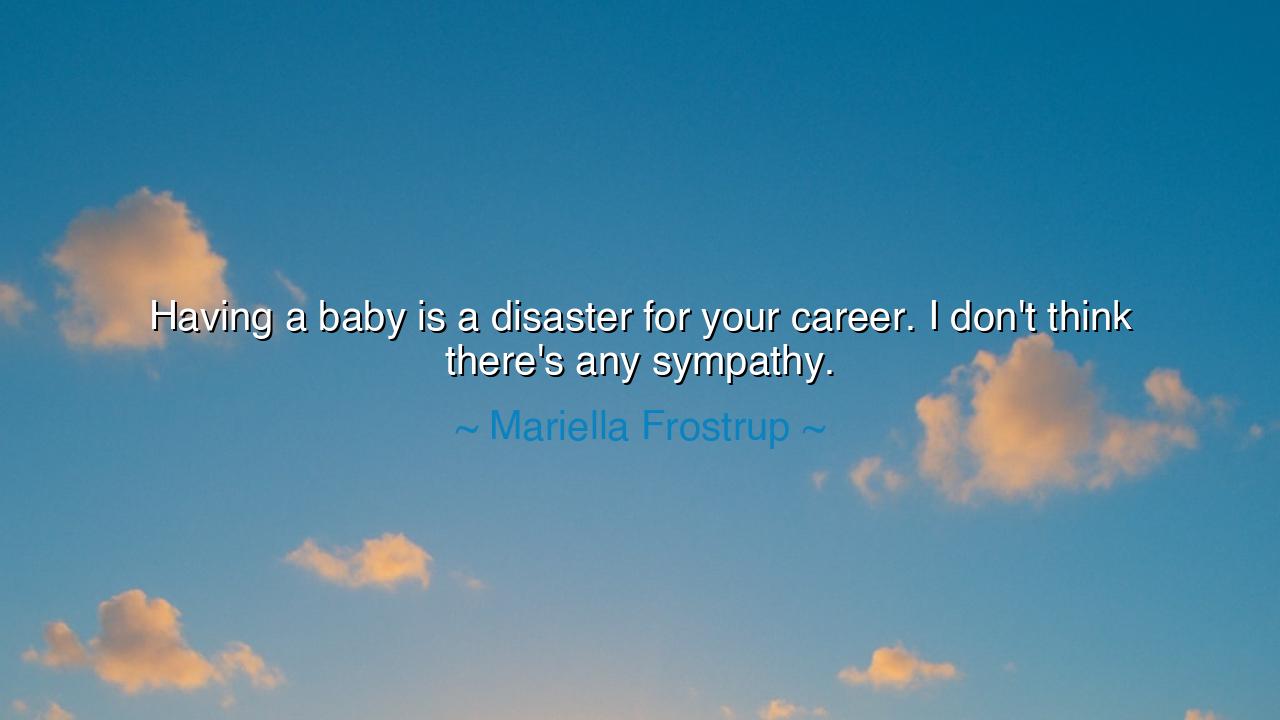
Having a baby is a disaster for your career. I don't think






In the course of human existence, there are few challenges more profound than balancing personal fulfillment and societal expectations. Mariella Frostrup, in her candid reflection, “Having a baby is a disaster for your career. I don’t think there’s any sympathy,” speaks not only to the modern struggle of women in the workplace, but to an ancient and enduring tension: the sacrifice of personal ambition for the sake of family. Her words highlight a profound truth—that in many societies, the pursuit of a career often demands single-mindedness, and any deviation from that path, particularly through motherhood, is seen as an obstacle rather than a privilege.
In the ancient world, the tension between family and individual ambition was ever-present, albeit often expressed in different terms. The Greek philosophers, for example, frequently debated the nature of personal duty versus the greater good. Aristotle believed in the importance of virtue in both private and public life, yet his ideas were often geared toward the pursuit of excellence in public endeavors. For women, the expectation of nurturing children often took precedence, and the notion of balancing motherhood with the intellectual or public sphere was rare, even if desired. The tension Frostrup speaks to was alive in ancient Athens, where the role of a woman was largely confined to the household, while men ventured into the world of public ambition and philosophy. The double standard existed then as it does today—where societal value is placed more heavily on a man's individual achievement, while a woman's worth is often measured by her ability to balance both career and family.
The Roman Empire provides another example of this dynamic. Augustus, the first Roman emperor, famously passed laws that sought to encourage marriage and childbearing among the elite, while simultaneously promoting the idea that personal duty to the state was paramount. In his reign, the public life of a man was celebrated, and the domestic world of women, particularly those in the aristocracy, was considered secondary. Despite his efforts to strengthen the empire through these laws, the role of women in the public realm remained subjugated. Frostrup’s comment reflects this ongoing societal struggle, where the expectations of family and career are often in conflict for women, as it was in the ancient past.
In modern society, Frostrup’s words resonate because they echo a double standard that still exists—where women are expected to excel in their careers while simultaneously taking on the majority of family duties. Career success, often the measure of personal worth in today's society, can be undermined by the biological imperative of motherhood, a role that continues to demand immense personal sacrifice. For women in professions—particularly those that require intense dedication, such as law, medicine, or entertainment—motherhood can be perceived as a hindrance rather than an enhancement. The narrative of motherhood as a disaster for one’s career reflects an underlying societal bias: the expectation that women must choose between family and ambition, a struggle that men are rarely forced to confront in the same way.
The ancient Egyptians also faced this dilemma in their societal structures. Nefertiti, one of the most powerful and influential queens in ancient Egypt, managed to wield great political influence while raising her children. Yet, even she was often bound by the expectations of dynasty and gender roles, where her power was often seen as secondary to that of the pharaohs. While Nefertiti did not face the same career expectations as modern women, her position reminds us that the balance between personal ambition and family responsibilities has always been a tension that few women in power could escape. As Frostrup points out, the sacrifice is often unseen—the support and sympathy for those who choose family over career or vice versa is often lacking, especially for women.
The lesson we can draw from Frostrup’s words is not just one of sympathy for those who face these struggles, but also of empowerment for women to reshape this narrative. In many cultures, women have been forced to choose between their personal aspirations and societal expectations. However, it is vital to recognize that true change will come when we stop asking women to make such choices. Instead, we must create spaces where family and career are not mutually exclusive, where both can be valued and supported. In doing so, we honor the contributions of women to society in both public and private spheres, breaking down the barriers that have long confined them to a limited role.
In our own lives, we must reflect on how we can support balance rather than sacrifice. For women who choose both career and family, we must advocate for systems that value and nurture their contributions. As we continue to evolve, let us remember the ancient lessons of equity, responsibility, and shared value. It is not enough to simply support women’s right to choose their paths; we must build structures that allow them to thrive in both family and career without the burden of choosing one over the other. Frostrup’s insight challenges us to question how we define success and to create a world where all paths are equally honored and supported.






AAdministratorAdministrator
Welcome, honored guests. Please leave a comment, we will respond soon